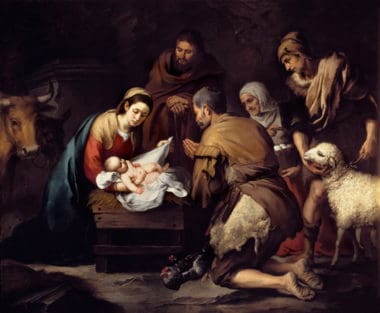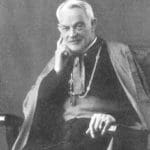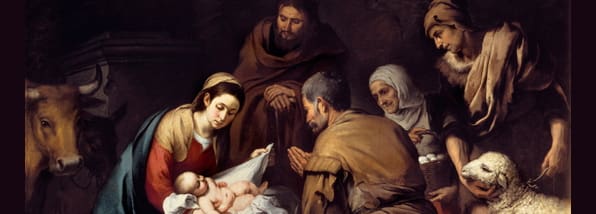THE ADORATION OF THE SHEPHERDS
“And it came to pass that after the Angels departed from them into Heaven the shepherds said one to another, ‘Let us go over to Bethlehem, and let us see this word that is come to pass, which the Lord hath showed to us.’ And they came with haste, and they found Mary and Joseph, and the Infant lying in a manger. And seeing, they understood of the word that had been spoken to them concerning the Child. And all they that heard wondered, and at those things that were told them by the shepherds. But Mary kept all these words, pondering them in her heart. And the shepherds returned, glorifying and praising God, for all the things they had heard and seen, as it was told unto them.” Luke 2:15-20
 1. Christian simplicity loves most to dwell on this visit of the shepherds to the manger. It is pictured more than any other scene; our cribs always try to represent it; our Christmas hymns, especially our oldest carols, win us with the simple story. And the reason is not difficult to find; for the shepherds “coming with haste,” without any express injunction from the angels, without any shadow of doubt in their hearts, and finding, apparently so easily, “Mary and Joseph and the Infant” and “understanding of the word,” though what they exactly “understood” they probably could not have told us–all this is eminently typical of that spirit of devotion which runs through all Christianity, which makes children “understand” the Blessed Sacrament, and which “draws all things to Himself,” the hearts of men finding in Christ our Lord the peace and the certainty which are nowhere else.
1. Christian simplicity loves most to dwell on this visit of the shepherds to the manger. It is pictured more than any other scene; our cribs always try to represent it; our Christmas hymns, especially our oldest carols, win us with the simple story. And the reason is not difficult to find; for the shepherds “coming with haste,” without any express injunction from the angels, without any shadow of doubt in their hearts, and finding, apparently so easily, “Mary and Joseph and the Infant” and “understanding of the word,” though what they exactly “understood” they probably could not have told us–all this is eminently typical of that spirit of devotion which runs through all Christianity, which makes children “understand” the Blessed Sacrament, and which “draws all things to Himself,” the hearts of men finding in Christ our Lord the peace and the certainty which are nowhere else.
2. The shepherds went away happy men. They had not known happiness of this kind before. They could not have wished to be anything other than just what they were; they would not have exchanged their rank with anyone; even now, wherever they are in heaven, one may safely say with St. Luke they are “glorifying and praising God for all the things they had heard and seen, as it had been told them” that night. So often in our lives there are moments which have made all the rest of life worth living, and for which we shall never cease to praise God for all eternity–a conversion, a special grace through the sacraments, a special light which has made us understand, a crisis through which we have been guided, a vocation, a dedication in some peculiar way, a proof beyond possibility of doubt of our Lord’s favour, and protection, and guidance, and intense love. We owe our Lord very much; we thank Him very little; the shepherds remind us of this duty.
3. There were two sets of people affected by the shepherds. The first were the simple people who heard the simple story from their simple lips. “And all they that heard wondered at these things that were told them by the shepherds.” There was proof enough for them in the narrative itself and in those who told it; just as little Bernadette is proof enough in herself of the Lourdes apparitions, or as a child that pours out its little heart in its first communion is proof enough in its degree of the Blessed Sacrament. They wondered; they did not pretend to understand; were content to revere. And, secondly, there was Our Lady. “But Mary kept all these words, pondering them in her heart.” How did she “ponder” them? What were her reflections? What deepest thoughts of deepest poets could compare with Our Lady’s ponderings? She knew so much, yet so little; and the much that she knew made her lose herself in God’s infinity.
Summary Mediation Points:
1. The shepherds, the models of devotion.
2. The effects of devotion on themselves.
3. Their effect on others.
 Editor’s Note: This meditation is from Archbishop Alban Goodier’s “The Prince of Peace” (1913).
Editor’s Note: This meditation is from Archbishop Alban Goodier’s “The Prince of Peace” (1913).
Art: The Adoration of the Shepherds, Bartolomé Esteban Murillo, between 1650 and 1655, Restored Traditions, used with permission. Mirror of Archbishop Alban Goodier, S.J., www.stmaryscadoganstreet.co.uk, all rights reserved, used with permission.




